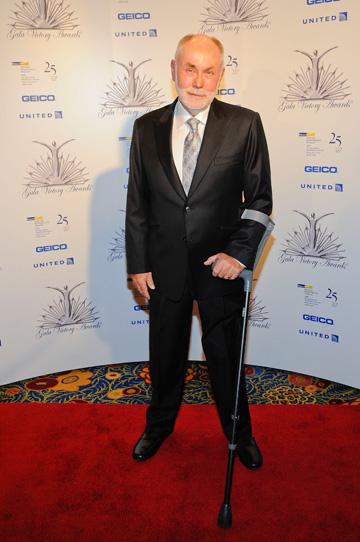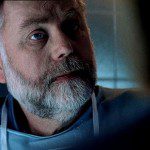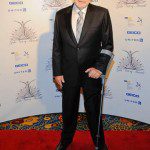I got a confession to make.
I’m a huge fan of the long-running CBS crime show “CSI” (for “Crime Scene Investigation”), the pioneering (first seen in October 2000) series set in Las Vegas, which spawned “CSI: Miami” and “CSI: New York.” I’ve always watched the original, mainly because I figured anything with Bill Peterson in it couldn’t be all bad, it had a cool theme song by The Who and it was set in Las Vegas.
Turns out that Robert David Hall is a big fan, too. The actor who has played Doctor Al Robbins, the chief medical examiner and king of the morgue on the show talks a little like a fan about the show, not even close to getting tired of the part, or the show, which has undergone numerous cast changes, top to bottom, over the years.
As these things often happen, he looks just like Doc Robbins, casually dressed, in a room at the Marriott in Woodley Park. There’s the doc’s characteristic white beard, the shiny top, compelling blue eyes, making him look younger than the 65 years he carries well. There’s a walking stick lying on the floor by the table we’re sitting at, the only immediate evidence that he’s also an actor with disabilities. In 1978, Hall, at the age of 30, lost both his legs and suffered major burns when his car was struck and crushed by a tractor trailer.
The good — and gruff, dark-humor loving, eccentric and not entirely PC—Doctor Robbins is also disabled and walks with the aid of a crutch and uses prosthetics, like Hall. Sometimes, Robbins has been seen in the show using a crutch like an air guitar and even singing with Bill Peterson, the original star of the show who played Grissom.
All of this, of course, speaks to his presence in Washington, a place he’s pretty familiar with. This time, he’s here as one of the recipients of the 25th Anniversary Victory Awards, given by the National Rehabilitation Hospital to individuals “who best exemplify exceptional strength and courage in the face of physical adversity.” He was among five honorees that include country singer Mickey Gilley, U.S. snowboarding champion Kevin Pearce, opera star Marqita Lister and NRH founder Edward Eckenhoff.
Hall has been a tireless advocate for job equality and his fellow actors with disability. As he says, “If you support diversity and thinks shows should give a portrayal of what America truly looks like, then performers with disabilities must be included in the equation. People have been very good at being politically correct. But there has been an assumption that disabled actors could slow down production, can’t do this or that, or that people won’t want to see them on screen.”
Hall, of course, goes beyond that. He’s visited Walter Reed Hospital many times and talked with veterans of America’s Middle Eastern wars in Iraq and Afghanistan, who have suffered disproportionately with loss of limb wounds.
“I don’t try to preach or tell them what to do,” he said. “What you’re there for as far as I’m concerned is to listen. And I think that’s what they want more than anything. They can see I know what it’s like. They’re not moping. And all I can say is that they will get over it, working every day, if they don’t give in to despair, if they have hope.”
Honored by the award, he’s also a little uncomfortable with the nation of “being some kind of brave and courageous hero.”
“I don’t see myself that way,” he said. “It’s a process. I like to think in all that time I’ve moved on quite a bit. Not entirely. Nobody does.”
“But what I am is Irish and that makes me stubborn. So, I’d say I’m stubborn and tough — not in a tough-guy sense, but hard and persistent, yeah, that’s okay. I got from my father and his father, Naval Academy guys.
He’s not a dweller on the past. What he is — and you sense this just walking into the room — is a guy looking for the next thing, the next word, the challenge. His eyes, a hypnotic blue, are alert-looking, interested and curious. He’s a talker, a story-teller. “Do something you’re afraid to do,” he said. “Accept challenges. Do something new, risky.”
“You know, you go to certain places from where you’re at, you know going to your job or the store, that kind of thing,” he says. “It drives my wife nuts. I don’t like routines, so I go a different way every time.”
Hall wanted to be a musician—“I played in bands, rock and roll folk.” He just cut an album. He has a voice made for acting, and for radio, and certainly music. If you don’t believe it, check out the YouTube clip from a “CSI” show in which Grissom and Robbins are cutting up a body and singing, and Hall sings the cause of death. It’s funny, but the voice carries and is grand, and could maybe wake the dead.
“CSI,” you can tell, has been a gift for him. He’s worked with everyone, those who starred and left, and those who stayed. No bad words here from him, not even about the other “CSI” shows. “You can say that, I won’t stop you,” he said. “I can’t. But we’re very competitive about status.”
“I got to be a regular halfway through the first season,” Hall said. “You know you’re doing good there when your face is on the opening credits.”
His character is kind of crotchety, off the wall, authoritative and funny. “I modeled him after my dad a little and a track coach in high school,” he said. “My dad was, well, okay, tough. Sometimes, I thought he was even mean. But I always knew he loved us, all of us. He just didn’t know how to do that touchy feely stuff.”
“You know, I’ve always got sort of back story in mind for the doctor,” he says. “It doesn’t matter to anybody. But on the Dec. 14 episode, just so you know, he’s going to take center stage. You’re going to meet the wife Judy (Wendy Drewson), and there’s a body at his house and a CSI investigation.”
It’s not hard to imagine Hall at the center of one or many of “CSI” episodes; what’s hard to imagine is this CSI without Hall.
“You know I look at days in terms of percentages, starting with 100 percent,” he said. “Today, it started out 100 percent because our plane landed safely and my wife is scared of flying. I got some aches and pains during the day, so it dipped a little but that’s all right. I like talking to people. It goes up.”
- John Rose / NPR
- Robert David Hall.




